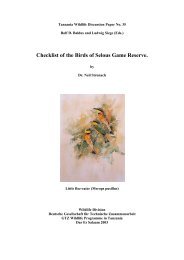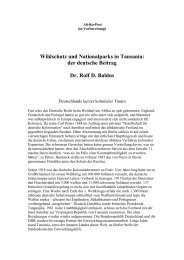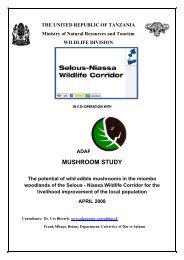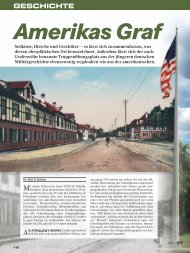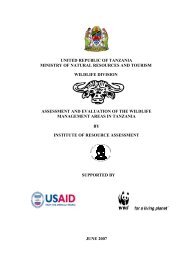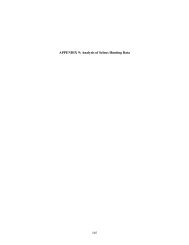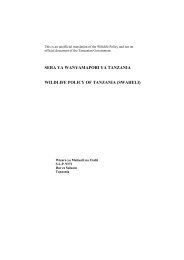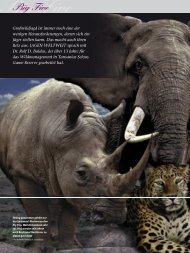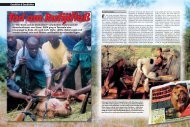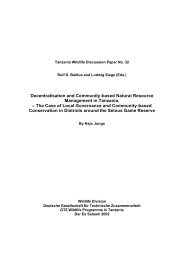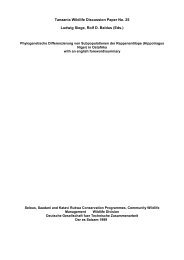African Indaba Articles - wildlife-baldus.com
African Indaba Articles - wildlife-baldus.com
African Indaba Articles - wildlife-baldus.com
Create successful ePaper yourself
Turn your PDF publications into a flip-book with our unique Google optimized e-Paper software.
Nobody denies the fact the safari hunting industry needs to accept long overdue pricing adjustments togenerate maximum sustainable hunting revenue for the country. Even substantially higher block lease costswill not necessarily drive up end-user hunting prices, although such a step would certainly affect excessiveprofit margins of some <strong>com</strong>panies and certain practices deviating huge amounts into individual pockets. Yet,it must be permitted to say that price increases promulgated by MNRT in July do not address the basicproblems inherent in the present system, nor do they offer a long term solution:‣ Blocks lease costs (from $7,500 to $10,000 2 years ago and now at $40,000 respectively$50,000) still do not reflect the true economic value of the hunting block. Some blocks may beworth less, others substantially more;‣ block adjudication Is not subject to independent control, lacks transparency and disregards theprinciple that the optimal price is a <strong>com</strong>petitive market-price. As the highest bidder is notnecessarily the ideal candidate, adjustments along an agreed set of rules and regulations canbe made by the tender <strong>com</strong>mittee;‣ the revenue obtained by the WD is still based on a “Pay-as-Used” instead of on a “Right-to-Use” system, and since major revenue streams still <strong>com</strong>e from trophy fees there is a tendencyto overhunt quotas and <strong>wildlife</strong> populations;‣ the “Pay-as-Used” system permits some hunting operators to restrict the number of exclusivesafaris in prime areas. Their price structure allows working with minimum safari days and lowoff-take of trophy animals whilst maximizing economic return, thus reducing the Government’sin<strong>com</strong>e.Moreover, the presentation and introduction date of the price increase after the hunting season hadbegun may be described as unwise, although insiders say that most of the current block holders can stillafford the higher block fees. These sources also say “the process showed the Wildlife Division’s lack ofunderstanding on how the hunting industry works”. Some insiders even suggest that “block contractsshould be cancelled en masse, and the current holders invited to submit bids to the WD suggesting a revisedfee”. The WD can then enter a memorandum of understanding with the operators in the interim while the restof the re<strong>com</strong>mendations are implemented.It is therefore suggested that the Government of Tanzania rescind the promulgated 2007 seasonincreases and instead look for an optimal solution from 2008 onwards. With political will and immediateaction a solution based on the proposals listed at the end of this chapter could be ready for implementation inthe first quarter of 2008 well ahead of the start of the 2008 season. A parallel media campaign could bestarted in late December to transparently inform the global hunting market.I submit that even a substantially higher increase in block leases, coupled with stable and marketrelatedtrophy fees would not necessarily drive up end-user prices, although it would certainly affect possiblyexcessive profit margins of some. We live in a <strong>com</strong>petitive world; although nobody is denying the operators areasonable profit margin, the international hunting associations – as responsible hunter-conservationists –should make sure that a substantial part of the funds paid for hunting safaris goes towards conservation andpoverty alleviation of Tanzania. This route will result in a "win-win" situation for all.Safari operators need to rethink pricing strategy and like in any other industry, must embark on strictcost saving measures in order to obtain an adequate profit margin. We also need price clarity in a way thatsafari prices (daily rates) should be inclusive of all extras, like hunting permit fees, block fees, conservationfees, <strong>com</strong>munity fees and trophy handling- preparation- and export-fees. Safari operators, who hold primehunting blocks are entitled to charge premium prices for their services and the market will certainly acceptthis.The Government should request transparency about concession lease holders, sub-letting of blocks,infrastructure costs, staff remuneration, office and administrative cost, marketing expenses, and the finaldestination of the funds paid by the hunting client, etc. It is the legitimate right of the Tanzanian RevenueAuthority (TRA) to levy the appropriate tax on business conducted in the country.Another issue, which must <strong>com</strong>e under review, is the safari marketing at international shows especiallyexpensive hunt donations. The US convention organizers benefit yearly substantially from booth rentals anddonations from safari operators. In 2006, the donation value of safaris in Tanzania to the US conventioncircuit is estimated to be close to 0.5 million dollars, but very little of this amount flows back into the country.146



